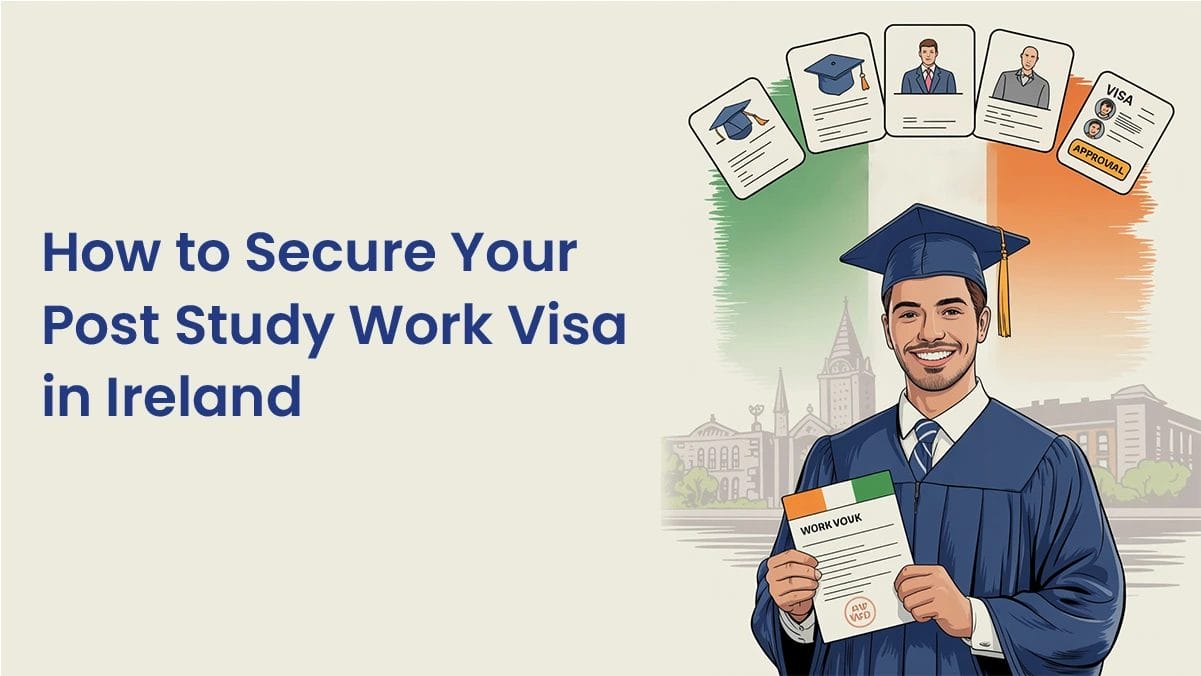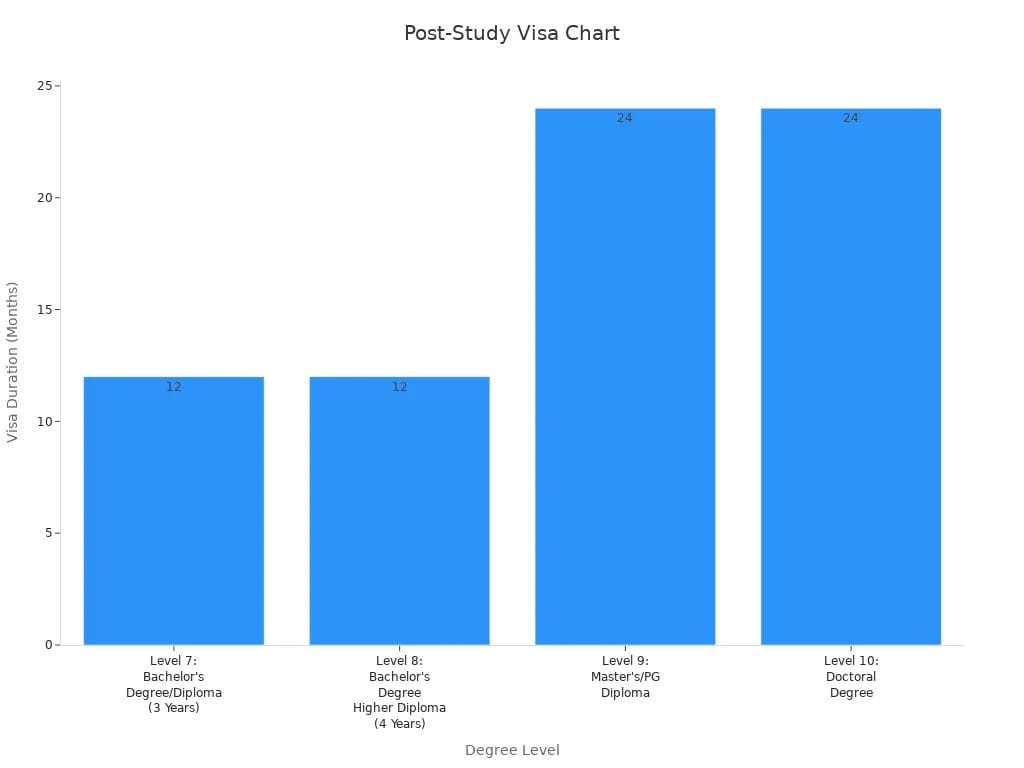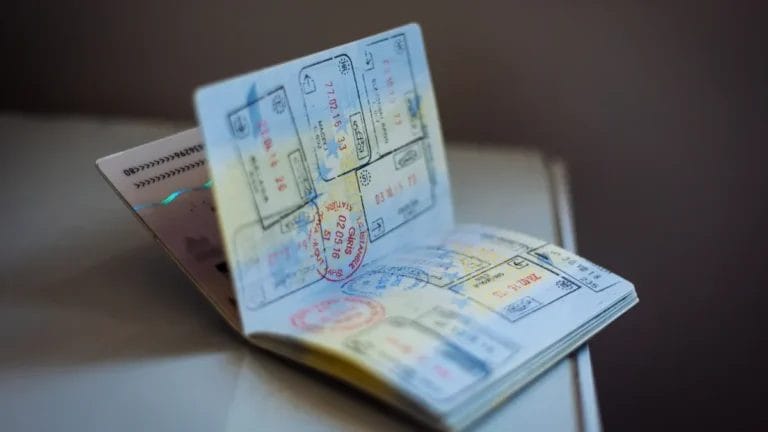
can open up excellent opportunities for your future. If you’ve recently graduated, this visa allows you to stay and work in Ireland, giving you a solid foundation to kickstart your career. Did you know that around 70% of graduates from Ireland’s public colleges secure employment shortly after graduation? Of those, nearly 60% land jobs within Ireland. A post study work visa in Ireland could be your pathway to joining them.
While the process might seem challenging at first, it becomes straightforward when you understand the requirements and gather the necessary documents. Each step you take brings you closer to starting your professional journey in Ireland.
Check if you qualify: Your degree must be Level 7 or higher from a recognized Irish school to get the visa.
Apply fast: Submit your post-study work visa application within six months after getting your final exam results.
Prepare documents: Gather your graduation proof, valid passport, money proof, and health insurance for your application.
Use school help: Ask your school’s international office for advice and support during the application process.
Stay updated: Look at official immigration websites often for rule changes and deadlines to make your application easy.
Getting a post-study work visa in Ireland starts with meeting the rules. Let’s go step by step to see what you need.
To get this visa, your education must meet certain levels. Graduates must finish a program at Level 7 or above on Ireland’s National Framework of Qualifications (NFQ).
Here’s how your degree level affects how long the visa lasts:
| Degree Level | Visa Duration |
|---|---|
| Level 7: Bachelor’s Degree/Diploma (3 Years) | 12 Months |
| Level 8: Bachelor’s Degree/Higher Diploma (4 Years) | 12 Months |
| Level 9: Master’s Degree/PG Diploma | 24 Months |
| Level 10: Doctoral Degree | 24 Months |
Not sure about your degree level? Ask your school or college. They can confirm if your degree matches NFQ standards.
Not every school or program qualifies for this visa. You must graduate from an approved Irish college or university. These include schools recognized by the Irish Naturalization and Immigration Service (INIS).
Tip: Before choosing a program, check if it qualifies for the visa. This will save you trouble when applying later.
Your program must also be full-time and lead to a Level 7 or higher qualification. If it doesn’t, you can’t apply for the visa.
Your immigration status is very important. As a student, you need a valid Stamp 2 visa while studying. This lets you stay in Ireland and work part-time (up to 20 hours a week during school terms).
After graduating, you must switch to a Stamp 1G visa. This visa is for graduates in the Third Level Graduate Program. To switch, you need a current immigration registration card.
Note: Apply for the post-study work visa within six months of getting your final exam results. Missing this deadline could stop you from staying in Ireland.
Timing is very important for your post study work visa. You have six months after getting your final exam results to apply. If you miss this deadline, you might lose your chance to stay in Ireland.
Follow these steps to stay on track:
Tip: If you’re confused about any step, ask your school’s international office for help. They can guide you and make sure you don’t miss anything important.
By staying prepared and acting early, you’ll avoid last-minute stress. The sooner you apply, the sooner you can focus on starting your career in Ireland.

The Third Level Graduate Program helps you stay in Ireland after graduation. It’s made for international students who want work experience in Ireland. This program lets you stay and work full-time for a set time based on your degree. You’ll change from a Stamp 2 visa (student visa) to a Stamp 1G visa through this program.
Quick Fact: The Stamp 1G visa isn’t tied to one employer. You can try different jobs or even start a business during this period.
This program is a great way to grow your career while enjoying Ireland’s lively work environment.
How long you can stay depends on your degree level. If you finished an undergraduate degree (Level 7 or Level 8), you can stay for 12 months. For postgraduate degrees (Level 9 or Level 10), you can stay for 24 months.
Here’s a simple chart:
| Degree Level | Visa Duration |
|---|---|
| Level 7 or 8 | 12 Months |
| Level 9 or 10 | 24 Months |
Postgraduate students get more time to find jobs and plan for long-term residency.
Your post-study work visa can lead to a long-term future in Ireland. After gaining work experience, you can apply for a General Employment Permit or a Critical Skills Employment Permit. These permits let you stay longer and work in specific fields.
Tip: If you work in a high-demand area like IT, healthcare, or engineering, the Critical Skills Employment Permit is a great choice. It also offers a quicker path to permanent residency.
By planning early, you can use your Stamp 1G visa time to build a stable career and later apply for permanent residency or citizenship.
Applying for a post-study work visa in Ireland can seem hard. Breaking it into steps makes it easier. Follow these steps to get started.
First, register with the Irish Naturalization and Immigration Service (INIS). If you studied in Ireland, you may know about INIS. They handle immigration services, including your visa application.
Go to the INIS website and create an account. Use the same details as on your passport and immigration card. Mistakes in your information can delay your application. After registering, use this account to apply for your visa and check its status.
Tip: Make sure your email is correct. INIS sends updates to this email.
Next, fill out the online application form. This form asks about your education, immigration status, and plans in Ireland. Be careful and check for mistakes. Errors can cause delays or rejection.
You’ll need to include:
Review the form before submitting it. Even small errors, like a wrong passport number, can cause problems.
Common Challenges:
Waiting for updates can feel long.
Mistakes in the form may lead to wrong visa info.
Website issues can affect tracking your application.
If you face problems, ask INIS or your school’s international office for help.
Finally, pay the application fee. This fee covers visa processing. You’ll find the payment section at the end of the form. Most people use credit or debit cards. Make sure your card works for international payments.
Check the INIS website for the latest fee amount. Save your payment receipt as proof. You’ll need it when submitting your application.
Note: If payment fails, check your card details. Some banks block international payments. Contact your bank if needed.
After finishing these steps, submit your application. Watch your email for updates from INIS. Processing times vary, especially during busy times like graduation season.
After paying the fee and finishing the online form, the next step is sending your documents. This step is very important because mistakes or missing papers can slow things down. Let’s make it simple so you can do it right.
Before sending anything, make sure you have all the needed papers. Even one missing document can cause problems. Use this list to stay organized:
Tip: Keep both paper and digital copies of your documents. If something gets lost, you’ll have a backup ready to use.
Once your documents are ready, send them to the Irish Naturalization and Immigration Service (INIS). You’ll usually upload them on the same website where you applied.
Follow these steps:
Note: If you’re unsure about any document, ask your school’s international office for help. They can check everything for you.
After sending your documents, you’ll need to follow your application’s progress. INIS will update you through your online account and email.
Here’s how to stay updated:
Pro Tip: Processing times can be slow during busy times like graduation season. Be patient, but follow up if it takes too long.
By staying organized and checking often, this step will go smoothly. Once approved, you’ll have your post study work visa and can start your career in Ireland.
To apply for your post study work visa, you need the right papers. Missing or wrong documents can slow things down. Here’s what you’ll need.
You must show you finished your studies. Use your degree certificate or an official transcript from your school. These papers prove your qualification and are required for the visa.
Tip: If your certificate isn’t ready, ask your school for a temporary letter. This can work as proof for now.
Your passport is your main ID for travel. It must be valid for your stay in Ireland. You also need your immigration registration card to show your visa status (Stamp 2).
Note: Check your passport’s expiration date. Renew it early if needed to avoid problems.
You must prove you can pay for your stay. Use bank statements or a sponsorship letter for this.
Why is this important? It shows you won’t struggle financially in Ireland. Without it, your visa might be denied.
Pro Tip: Get your financial papers ready early. This gives you time to fix any issues before applying.
By organizing these documents well, your application will go smoother, and you’ll have a better chance of approval.
To get your post-study work visa in Ireland, you must show proof of your address and health insurance. These papers confirm you’re ready and settled for your stay. Let’s make this step simple.
You need to prove where you live in Ireland. This could be a rented apartment, student housing, or another place.
Use these documents as proof:
Tip: If you just moved and don’t have a bill yet, ask your landlord for a signed letter. It should include your name, address, and move-in date.
Make sure the address on your document matches your application. Even small mistakes, like missing an apartment number, can delay your visa.
Health insurance is required for your visa. It proves you can handle medical costs while in Ireland. Here’s what to check:
Your insurance must cover the full time of your visa.
It should include hospital stays and emergencies.
You can use private insurance or a student health plan.
If you’re unsure which plan to pick, ask your school’s international office. They often suggest plans for international students.
Note: Keep a copy of your insurance policy and payment receipt. You might need them during your visa process.
By preparing these documents early, you’ll avoid rushing later. Once everything is ready, you’re closer to getting your post-study work visa!

A post-study work visa lets you start your career in Ireland. You can use what you learned in school in real jobs. Ireland has growing industries like tech, medicine, and finance. These fields offer many chances to learn and grow.
With this visa, you can work full-time and earn money. Bachelor’s graduates get one year, and master’s graduates get two years. This time helps you improve your skills and build your resume. Working in Ireland’s diverse workplaces also helps you grow as a person.
Tip: Try different jobs to find what you enjoy most.
This visa isn’t just for short-term work. It can help you stay in Ireland longer. Time spent working with permits counts toward permanent residency.
If you get a Critical Skills Employment Permit, you can stay even longer. This permit is great for jobs in IT, healthcare, and other needed fields. Over time, you can apply for citizenship and make Ireland your home.
Note: Plan your career early to meet Ireland’s visa rules. Focus on jobs that help you stay longer.
Ireland’s job market is booming, and this visa connects you to it. Big companies and startups in Ireland offer jobs in many areas. Whether you like tech, finance, or creative work, there’s something for you.
This visa also lets you meet professionals and attend job events. Networking can help you find exciting jobs and projects. By the end of your visa, you’ll have a strong career base in Ireland or elsewhere.
Pro Tip: Keep an eye on growing industries in Ireland. This helps you aim for the best jobs.
Your post-study work visa in Ireland is more than just a work pass. It’s a chance to meet people and grow your career. Making connections can lead to great jobs and learning from experts. Here’s how to use this opportunity well.
Ireland has many job fairs, meetups, and workshops. These events help you meet employers and other professionals. Check your school’s career office or local boards for event updates.
Tip: Practice a short intro about yourself. Include your skills, studies, and job goals. This helps people remember you.
Many fields in Ireland have special groups or clubs. Joining them connects you with skilled people and hidden job offers. For example, tech students can join Technology Ireland.
Pro Tip: Use LinkedIn to find and join these groups. It’s also great for learning about new trends.
Your school’s career services can be very helpful. They host alumni events, job talks, and career advice sessions. Don’t be shy—ask for their support.
A good LinkedIn profile can help you stand out. Show your skills, connect with others, and apply for jobs there. Post about your projects or wins to catch recruiters’ eyes.
Note: Keep your profile neat and updated. A strong online image makes you look professional.
By networking and using these tools, you’ll find jobs and build lasting career connections.
Starting early helps you avoid stress and stay organized. It also gives you a better chance of success.
Why it matters: Preparing early helps you submit a strong application. A complete and accurate application improves your approval chances.
Don’t delay. Use reminders, make a checklist, and start right after graduation. Being proactive now will save you trouble later.
Your documents are the most important part of your visa application. Even small errors can cause delays or rejection. Always review them carefully.
Tip: Keep both paper and digital copies of your documents. This way, you’ll have backups if anything gets lost.
Accurate documents show you’re serious and make the process easier for immigration officers.
Your school’s international office is a great resource for visa advice. They’ve helped many students like you before. Don’t hesitate to contact them.
Pro Tip: Build a good connection with the staff. They can give you extra support and even link you with alumni who’ve succeeded in getting their visas.
By using their help, you’ll feel more ready and avoid common mistakes that could slow your application.
Immigration rules can change fast. Knowing the latest updates is important for your post-study work visa. Missing key changes might affect your plans. Here’s how to stay informed.
Visit the Irish Naturalization and Immigration Service (INIS) website often. It has the most accurate information. Save the site link and check it regularly for news about deadlines or new rules.
Tip: Sign up for email alerts on the INIS website. Updates will come straight to your inbox.
Your university’s international office shares helpful immigration updates. Attend their events or workshops to learn about changes. If you have questions, ask them—they’re there to assist you.
Find online groups for international students in Ireland. These communities share tips and news about visa policies. Always confirm information with official sources before acting on it.
Pro Tip: Make a habit of checking these sources weekly. Staying consistent keeps you ready for any updates.
By staying informed, you’ll feel more prepared for your visa application and future in Ireland. Knowing the rules gives you confidence and control.
Getting your post-study work visa in Ireland can be simple. First, learn the rules, collect your papers, and apply within six months of graduating. Starting early helps you fix problems and makes things easier. Your school’s international office can also help if you’re unsure about anything.
This visa lets you gain work experience, join Ireland’s growing job market, and even plan for permanent residency. It’s a great way to start your future in Ireland. Begin now and take the first step toward success!
You won’t get the post-study work visa. You’ll have to leave Ireland or look for other visa options.
Tip: Use reminders to track important dates after graduation.
Yes, you can work part-time with your Stamp 2 visa until your Stamp 1G visa is approved.
Note: Make sure your immigration card stays valid during this time.
No, a job offer isn’t needed. The visa lets you find work or start a job after approval.
Yes, you can apply for permits like the Critical Skills Employment Permit if you qualify.
Pro Tip: Plan ahead to make the switch easier.
Yes, health insurance is required. It covers your medical costs while in Ireland.
Emoji Reminder: 🩺 Check that your policy lasts the full visa period!
